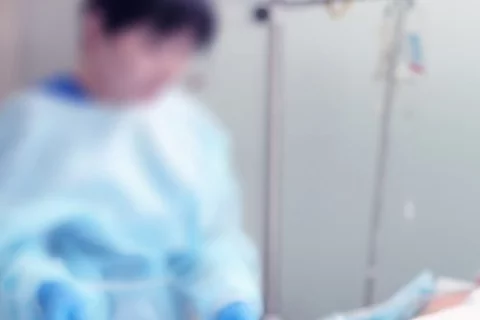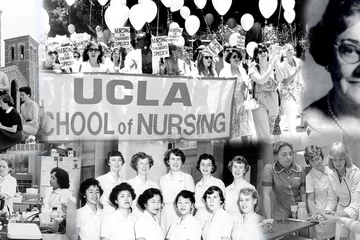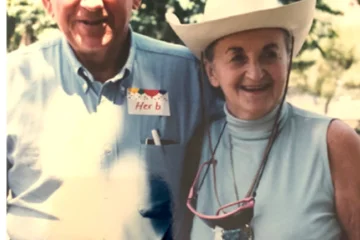AS THE RESPONSIBILITY OF NURSING IN HEALTHCARE DELIVERY CONTINUES TO EXPAND, THERE IS PERHAPS NO MORE CRITICAL ROLE IN DRIVING CHANGE TO IMPROVE PATIENT OUTCOMES THAN THE CLINICAL NURSE SPECIALIST.
The CNS is an advanced practice nurse with a Master’s degree who is behind the scenes, who is making a difference in patient outcomes and who knows what can be achieved when the entire healthcare team works synergistically.
Clinical Nurse Specialists play a unique role in the delivery of high-quality nursing care and have a major impact on the three spheres of influence, the patient/family, the healthcare team and the organization. They are experts in evidence-based practice in a range of specialty areas. At the school, we have been offering the Clinical Nurse Specialist option since the mid-1960s, one of the first schools in the country to do so. We currently offer the clinical nurse specialist option for our Adult/ Gerontology-Acute and Pediatric specialties (standalone CNS or dual CNS/NP options).
The CNS portrays many roles: teacher, mentor, consultant, researcher, management and manager. They greatly influence outcomes by providing expert consultation to the entire healthcare team and by implementing improvements in health care delivery systems.
Currently there are approximately 67,000 clinical nurse specialists across the country. In 2015, CNN Money declared the CNS as one of the Top 10 careers offering big growth, great pay and most of all satisfying work. Clinical Nurse Specialists are board certified as an advanced practice nurse both in their population and in their area of specialization (i.e. Adult/Gero Critical Care or Pediatric-Oncology).
Three alumni of the UCLA School of Nursing Master’s Program are considered influential leaders in the CNS role: Robin Watson, Linda Gorman and Flerida Imperial-Perez. Because their work environment is different, each of their experiences have also been different. The one thing they all agree on: it is the ideal job. “It’s a great role as you are autonomous and want to change practice” Robin Watson
When Watson became a CNS, it was still an emerging role and was still being defined. Her career was spent at Harbor-UCLA Medical Center where her specialty was in pediatrics. Over the years, Watson led several major projects that improved safety and patient outcomes. One of her most impactful projects was changing pain management for children at the hospital. A medication program to improve the safety of continuous infusion medications was adopted in hospitals throughout the county and she received a patient safety award from LA County for this evidence based work.
CLINICAL NURSE SPECIALISTS PLAY A UNIQUE ROLE IN THE DELIVERY OF HIGH-QUALITY NURSING CARE AND HAVE A MAJOR IMPACT ON THE THREE SPHERES OF INFLUENCE, THE PATIENT/FAMILY, THE HEALTHCARE TEAM AND THE ORGANIZATION.
“CLINICAL NURSE SPECIALISTS USE THEIR KNOWLEDGE AND COMMITMENT TO EVIDENCE-BASED PRACTICE TO HELP ORGANIZATIONS ACHIEVE EXCELLENCE IN PATIENT CARE, SERVICE AND VALUE. THEY ARE ESSENTIAL MEMBERS OF THE LEADERSHIP TEAM.”
Linda Burnes Bolton, DrPH, RN, FAAN
Vice President, Nursing & Chief Nursing Officer Cedars-Sinai
Many of her projects,which started in the hospital and went countywide throughout the Department of Health Services in LA County focused on staff development and competency programs because“she liked to inspire excellence in others.” Watson also shared hertalents internationally, bringing teams to teach resuscitation and nursing skills to many critical care units in Romania and Viet Nam to name a few.“The CNS brings people and processes together and makes them happen.You don’t always know when they’re there, but you know when they are not there,” said Watson.What makes a CNS so unique?“Being able to wear all the hats– you are a role model, educator,researcher.” Linda Gorman was selected as “CNS of the Year” in 2009 from the National Association of Clinical Nurse Specialists. She retired as a CNS five years ago. She was one of the longtime members of the Cedars-Sinai Medical Center palliative care team and one of the essential backbones who has helped develop the team over the years. She worked tirelessly to educate nurses, social workers, case managers and physicians on concepts of palliative care.
One of her projects looked at the units where patients died in the hospital and with that data helped develop information for nurses to care for the imminently dying patient including symptom management. Another project resulted in a policy to provide nurses with the support they needed to overcome concerns about adjusting pain medication at end of life — “when the goals change from prolonging life to maximum comfort, you need to give nurses the resources and support they need.” She was co-author/editor for several books, including two award-winning text books:Psycho social Nursing Care Along the Cancer Continuum and Psycho social Nursing for General Patient Care.“The job isn’t always easy. You’ve got to be flexible and you have to be a change agent,” added Gorman. “I think every hospital should have at least one CNS.”“I am a CNS because I want to make a difference” Flerida Perez.In an environment where the CNS role implementation and actualization are often unequivocal and difficult to describe, a superb role model is imperative. Fortunately for Perez,when she worked as a staff nurse in the Cardiothoracic ICU (CTICU)at UCLA Medical Center (currently the UCLA Ronald Reagan), she was captivated by the dedication and commitment of the CNSs in the hospital which drove her to pursue graduate studies to become a CNS.
ALL THREE POINTED OUT THAT COLLABORATION IS A CRITICAL CHARACTERISTIC
OF THE PROFESSION. AND IT IS A CORE COMPETENCY OF BEING A CNS.
Soon after her graduation from the CNS program, she was offered the CNS position within her own unit. Perez felt very fortunate that her first job as a CNS was working with perhaps the best CNSs in the nation. “I could not ask for a better opportunity to be mentored by one of the best!” She learned the most invaluable lesson that “servant leadership, along with the three spheres of influence (patient, staff, and the organization) guide the success of a CNS role and practice.” Perez, developed her clinical expertise in the area of adult and pediatric cardiac critical care. In 2000, driven by her desire to focus on the pediatric cardiac population, she took a position at Children’s Hospital Los Angeles. In collaboration with the Unit Medical Director, she implemented an interdisciplinary process improvement (PI) Committee that resulted in numerous PI projects leading to the implementation of EBP standards of care, publications, and more importantly, improvement of patient outcomes. Perez is the recipient of the 2015 American Association of Colleges of Nursing Circle of Excellence Award – a testament to her commitment to excellence in patient care. “When I precept a new CNS I always say ‘if you have a need to be in the limelight or be directly credited for the projects you are involved in, CNS is not the best fit for you.’ Your success is measured by the success of those you worked with — you are the unseen influence!” All three pointed out that collaboration is a critical characteristic of the profession. And it is a core competency of being a CNS.
“You have to be able to build and maintain relationships when things get difficult,” said Watson. “I found that physicians really valued the role because they appreciate the systems thinking perspective.” Learning that collaboration is key and starts in the classroom. Jessica Maganda, a 2nd year APN/CNS student just completed her first project as part of the Theoretical Foundations class. She observed “you have to have good relationships with the nurses because they are not only going to be implementing the project, but need to feel comfortable coming to you with suggestions or concerns.” The CNS is playing a crucial role in healthcare care, bringing their value, expertise and skills to ensure the use of best practices and evidence-based care to achieve the best possible patient outcomes. To learn more about our clinical nurse specialist programs, visit our website at nursing.ucla.edu. A recent story in USA Today focused on how Mattel Children’s Hospital changed its policies to promote patient sleep. Quoted in the story was Theresa Kirkpatrick a clinical nurse specialist in the pediatric intensive care unit who led the effort and a graduate of the CNS program at UCLA.




